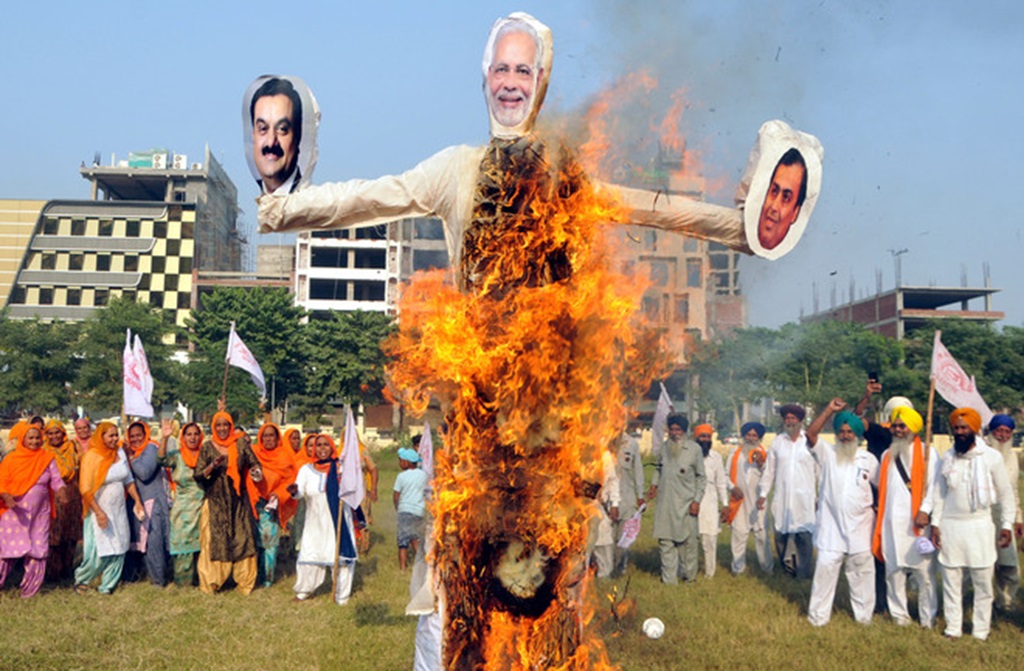Indian farmers demanding higher crop prices torched effigies of Prime Minister Narendra Modi and other officials on Friday, hoping to expand their protest against his government months before elections.
Thousands of farmers began a ‘Delhi Chalo’ (Let’s Go to Delhi) march last week, but were stopped by security authorities approximately 200 kilometres (125 miles) north of the capital, who used water cannons and tear gas to push them back.
On Thursday, farmer leaders announced a series of “mega programmes” across India to urge their demands. Following Friday’s “Black Day,” there will be a tractor rally on roads on February 26 and a farm workers’ public gathering in Delhi on March 14.
On Friday, black flags flew from tractors and trolleys parked at the protest location. Several demonstrators, the most of whom are Sikhs from the northern province of Punjab, also wrapped black cloth around their turbans in solidarity.
Farmers also burned effigies of Home (Interior) Minister Amit Shah and Haryana’s chief minister, accusing their police force of employing force against them, and sang slogans demanding minimum crop prices.
The farmers halted their march for two days on Wednesday following the death of a demonstrator, which they blamed on police violence.
Sartaj Singh, a senior police officer in Punjab’s Sangrur district, where the event occurred, said the guy died at a protest site, but the cause of death would not be established until after the autopsy.
Punjab Chief Minister Bhagwant Mann stated on Friday that the dead man’s family would receive 10 million rupees ($120,000) in compensation. Farmer leaders refused the compensation and stated that the autopsy would not be conducted until a murder case was registered.
“We will have a meeting in the evening to decide the next steps (regarding the march),” farmer leader Sarwan Singh Pandher told reporters.
Amnesty International condemned the protester’s killing, urging the government to “respect, protect, and facilitate the right to peaceful assembly.”
“The price of protest must not be death,” stated Amnesty International India’s board chair, Aakar Patel.
Meanwhile, social networking site X announced on Thursday that it would restrict some accounts and postings from India in reaction to the government’s executive orders. X stated that while it disagreed with the ruling, failing to comply might result in “potential penalties including significant fines and imprisonment.”
“We will withhold these accounts and posts in India alone; however, we disagree with these actions and maintain that freedom of expression should extend to these posts,” the platform’s Global Government Affairs said without naming the accounts.
The notice did not specify why, but some local media sites linked the government’s executive order to the continuing farmers’ demonstrations.
Tens of thousands of Indian farmers, largely from the northern province of Punjab, have been demonstrating since mid-February, renewing calls for higher crop prices promised to them in 2021.
They’ve been marching towards New Delhi for over a week, but rallies were halted on Wednesday when a child demonstrator and several were hurt in fights with police, who shot tear gas and used water cannons to disperse thousands, according to Reuters.
India’s government and X have been at odds for years.
In June, Jack Dorsey, co-founder of Twitter, which Musk relaunched as X, claimed the Modi government in India had threatened to shut down the network unless it followed orders to remove accounts that criticised how the government handled prior farmer demonstrations.
Prime Minister Narendra Modi’s government has dismissed the charges as a “lie.”
In October, the Modi administration informed Musk that X will have to comply with the country’s new and impending IT regulations.
During the epidemic, X was instructed to remove posts critical of the government’s handling of Covid-19.
According to CNBC, India’s freedom of expression scored 0.52 in 2022, lower than Pakistan (0.66) and Sri Lanka (0.67).
X stated in a post that it was unable to publish the executive orders “due to legal restrictions.” However, the corporation stated that it has filed an appeal against the Indian government about accounts that are undergoing blockage.
“We have also provided the impacted users with notice of these actions in accordance with our policies,” the company said in a blog post.
“We believe that making them public is essential for transparency,” according to the statement. “This lack of disclosure can lead to a lack of accountability and arbitrary decision-making.”
Indian residents flocked to social media to show their dissatisfaction with the decision, writing angry messages such as “Shame on you, Dictator Modi” and “Freedom of expression cannot mean spreading anarchy in the country.”






